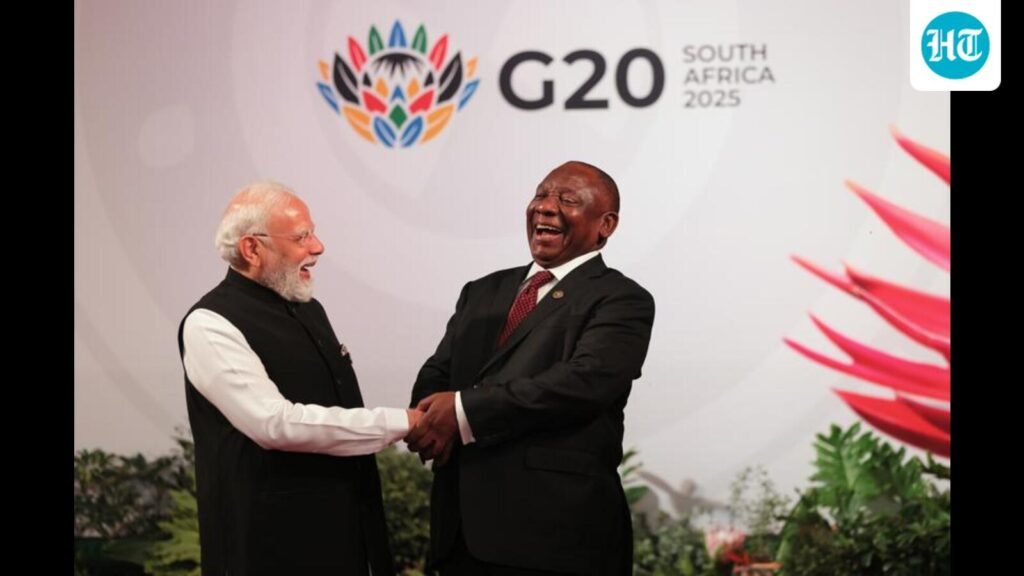
The recently concluded summit of the Group of 20 (G20) nations and organizations in Johannesburg, South Africa, marked two special milestones in the evolution of an international institution that is crucial for global governance and world order.

First, it ended one full cycle of all G20 member countries hosting a summit each since 2008, when the first gathering of heads of government happened in the United States (US) amid the emergency of the international financial crisis. By rotation, the G20 baton has been passed around and given every host country a sense of visibility, ownership and responsibility to steer the world economy through multiple challenging phases.
South Africa’s G20 summit was particularly special as it was the first to happen in Africa and included participants invited from several non-G20 African countries and sub-regional bodies. Host leader president Cyril Ramaphosa’s agenda-setting for the summit, seeking solutions for Africa’s pressing problems, brought the world’s poorest continent to the centrestage. If India’s historic G20 presidency in 2023 gave the African Union (AU) full membership, then South Africa’s presidency ensured that the interests of 1.5 billion African people cannot be ignored.
Second, from a broader Global South perspective, the South African G20 summit was the culmination of a four-year stretch of presidencies held by developing countries. The journey from Indonesia (2022), India (2023) and Brazil (2024) to South Africa (2025) was one of cumulative gains for rendering the world economy fairer and more just towards the weakest and most vulnerable.
Thanks to the chain mechanism of the troika system, the past four years of the G20 witnessed a progressive and bottom-up turn wherein all members, including the rich G7 group countries, had to accommodate the wishes and concerns of the Global South in their positions and policies. Warts and all, in recent times, no other international body has managed to stabilize and democratize the world order and give hope to people everywhere that some collective action and multilateral cooperation is still possible in a divided and polarized environment.
The fact that South Africa’s G20 summit yielded a Leaders’ Declaration, in spite of the provocative boycott by the US and open threats from Washington against issuing a joint communiqué in its absence, spoke volumes about the determination of most major economies not to allow spoilers to sabotage urgently needed reforms and initiatives for the Global South. Only Argentina, a staunch ideological ally of the US, opted out, but the Declaration went through without getting stuck on the principle of all hands on deck and every single member in agreement. South Africa’s assertion that it had “sufficient consensus” as opposed to total consensus for adopting the Leaders’ Declaration was a departure from the G20 norm, but an appropriate one to retain at least some public faith in multilateral entities.
Key outcomes of the Johannesburg summit — raising the requirement of climate finance needed by poor nations to $5.9 trillion, supporting poor nations vulnerable to excessive and unsustainable foreign debt, and ensuring that exploration of critical minerals benefits natural resource-rich but economically poor producer countries — were all anathema to the right-wing populist vision of US President Donald Trump. But the fact that they figured in the Leaders’ Declaration, thereby making these decisions part of the G20’s history and continuity, was a clear sign that even the most powerful economy in the world cannot hold the rest of the global community hostage and bend it to its ideological preferences and diktats.
Of course, there is merit in the argument that multilateral agreements cannot realistically succeed if a hefty player like the US stays out or undermines these. By virtue of its sheer financial might and political influence, the abdication of the US from the South African G20 summit on questionable grounds of alleged genocide of white minorities would imply that implementation of the commitments and resolutions will be harder. Just as the Trump administration’s abandonment of the World Trade Organization (WTO) and of the United Nations environmental conferences has thrown up dilemmas about whether multilateralism in trade and the climate crisis is feasible, the lack of American buy-in does not augur well for the success of the G20.
Call it poetic injustice or dramatic irony, the fact is that the US is scheduled to host the next G20 summit in 2026. Given the disruptive track record of the Trump administration’s economic nationalism and its pressure tactics aimed at the Global South, can the G20 survive the upcoming US presidency and continue being the beacon of Global North-Global South coordination and joint management of the international economic order?
The signs are ominous and there will be attempts to dilute the pro-Global South tilt that the G20 took on in recent years. With even the simple ceremonial handover of the presidency from South Africa to the US embroiled in controversy, as Washington riled the hosts with a protocol snub by designating a low-ranking American embassy official for the task, the G20 could run into rough weather in 2026.
Given this risk, the best safeguard for the G20 would be for its remaining committed countries and intergovernmental organizations to embed the Johannesburg Declaration’s outcomes in their respective national policies and plans and concretely implement them so that the weight of institutional processes and practices on the ground sets up a fait accompli that will not be reversed by any future antisocial presidency. We simply cannot afford to lose the Global South-oriented character which has come to define the G20 since 2022.
Sreeram Chaulia is dean, Jindal School of International Affairs. The views expressed are personal




